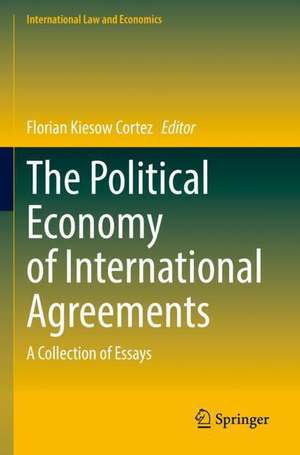The Political Economy of International Agreements: A Collection of Essays: International Law and Economics
Editat de Florian Kiesow Cortezen Limba Engleză Paperback – 28 sep 2022
The book examines how specific democratic design elements channel and mediate domestic demands directed at politicians, and how under certain circumstances entering international agreements helps politicians navigate these demands to their benefit. The volume also distinguishes between different types of international instruments with a varying expected constraining effect upon member states, and empirically tests if this matters for incentives to join.
The volume addresses scholars, students, and practitioners interested in a better understanding of how the shape of domestic institutions affects politicians’ incentives to enter into binding international agreements.
| Toate formatele și edițiile | Preț | Express |
|---|---|---|
| Paperback (1) | 991.24 lei 6-8 săpt. | |
| Springer International Publishing – 28 sep 2022 | 991.24 lei 6-8 săpt. | |
| Hardback (1) | 997.09 lei 6-8 săpt. | |
| Springer International Publishing – 27 sep 2021 | 997.09 lei 6-8 săpt. |
Preț: 991.24 lei
Preț vechi: 1208.83 lei
-18% Nou
Puncte Express: 1487
Preț estimativ în valută:
189.73€ • 206.16$ • 159.48£
189.73€ • 206.16$ • 159.48£
Carte tipărită la comandă
Livrare economică 21 aprilie-05 mai
Preluare comenzi: 021 569.72.76
Specificații
ISBN-13: 9783030851965
ISBN-10: 3030851966
Pagini: 122
Ilustrații: VII, 122 p. 1 illus.
Dimensiuni: 155 x 235 mm
Greutate: 0.2 kg
Ediția:1st ed. 2021
Editura: Springer International Publishing
Colecția Springer
Seria International Law and Economics
Locul publicării:Cham, Switzerland
ISBN-10: 3030851966
Pagini: 122
Ilustrații: VII, 122 p. 1 illus.
Dimensiuni: 155 x 235 mm
Greutate: 0.2 kg
Ediția:1st ed. 2021
Editura: Springer International Publishing
Colecția Springer
Seria International Law and Economics
Locul publicării:Cham, Switzerland
Cuprins
Chapter 1. Introduction.- Chapter 2. Domestic Institutions and the Political Economy of International Agreements: A Survey and Hypotheses.- Chapter 3. Domestic Institutions and the Ratification of International Agreements in a Panel of Democracies.- Chapter 4. Choosing to Be Constrained: Electoral Institutions and the Varieties of International Organizations.- Chapter 5. Enforcing International Deals: The System of International Organizations from a Politics-as-Exchange Perspective.
Notă biografică
Florian Kiesow Cortez is a researcher and lecturer in political economy. His research focuses on comparative political economy, global governance, global public goods, the design of international organizations, and the empirical analysis of constitutions. He has published work empirically assessing determinants of international treaty ratification. He is also interested in the political economy of under-development.
He obtained his doctorate from the University of Hamburg, Germany, where he was a member of a graduate school organized by the Institute of Law and Economics and funded by the German Research Foundation (DFG). He was formerly a research fellow at George Mason University, Arlington, USA, and a visiting research fellow at Columbia University, New York, USA, and at the University of California, Berkeley, USA.
He obtained his doctorate from the University of Hamburg, Germany, where he was a member of a graduate school organized by the Institute of Law and Economics and funded by the German Research Foundation (DFG). He was formerly a research fellow at George Mason University, Arlington, USA, and a visiting research fellow at Columbia University, New York, USA, and at the University of California, Berkeley, USA.
Textul de pe ultima copertă
This volume analyzes international agreements from a political economy perspective. In four essays, it raises the question of whether domestic institutions help explain if countries join international agreements, and in case they do, what type of international organization they join.
The book examines how specific democratic design elements channel and mediate domestic demands directed at politicians, and how under certain circumstances entering international agreements helps politicians navigate these demands to their benefit. The volume also distinguishes between different types of international instruments with a varying expected constraining effect upon member states, and empirically tests if this matters for incentives to join.
The volume addresses scholars, students, and practitioners interested in a better understanding of how the shape of domestic institutions affects politicians’ incentives to enter into binding international agreements.
The volume addresses scholars, students, and practitioners interested in a better understanding of how the shape of domestic institutions affects politicians’ incentives to enter into binding international agreements.
Caracteristici
Presents political economy explanations of States’ international engagement Scrutinizes the effects of domestic-level institutional features on politicians’ incentives Performs empirical tests drawing on data covering a worldwide sample of democratic countries










